Beauties and the Beast
Two California assemblymen have introduced legislation to try and tame the ugly freelance-busting monster known as Assembly Bill 5.
The current wave of freelance busting that continues to be a nationwide problem—such a big problem that Congress is now attempting action to stop it from ever being tried at the federal level again—traces one of its deepest roots to a California law called Assembly Bill 5.
AB5 went into effect January 1, 2020, and continues to be such an ugly beast of a failure that two members of the California Legislature are taking new action to try and tame it:
Assemblyman Tri Ta just introduced Assembly Bill 504, which is specific to the beauty industry, to restore independent contractor status for licensed manicurists permanently.
Assemblyman Carl DeMaio just introduced Assembly Bill 522 to outright repeal AB5 for everyone, once and for all.
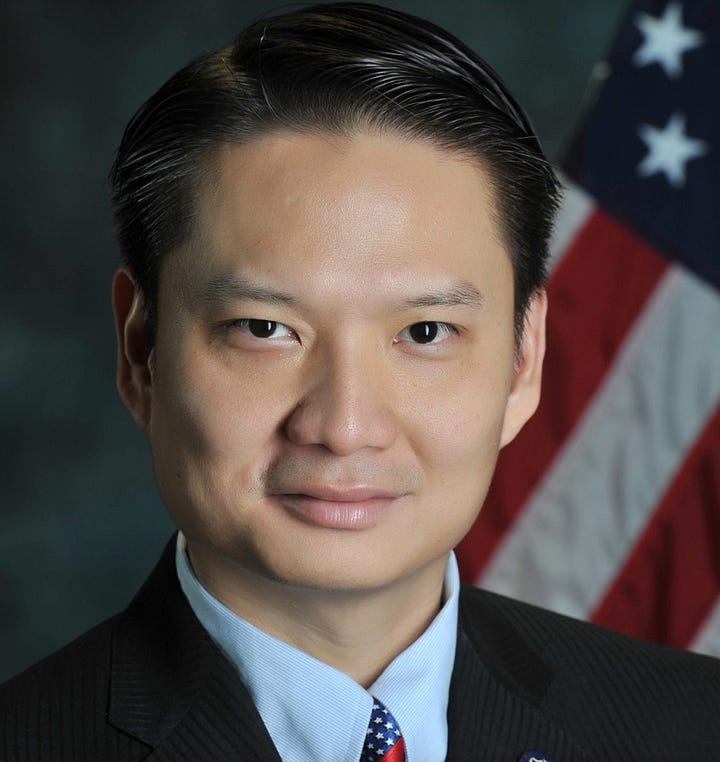

Assemblyman Ta is also calling for a U.S. Department of Justice investigation into California’s labor laws, which he says discriminate against manicurists by preventing them from earning income as independent contractors.
The problem he describes is rooted in the way professional exemptions were granted, or not granted, regarding who actually has to comply with AB5. Some professions received full exemptions. Others received temporary or partial exemptions. Still others received no exemptions, leading some experts to call AB5 a “Swiss cheese” law.
Manicurists only received an exemption from AB5 for several years. As a local ABC News affiliate reported in September 2024, that temporary exemption is now expiring, leaving manicurists like Janice Luper with fewer options and frustrating questions:
“I’m not understanding why we’re not being given the same opportunity as everybody else in our industry," she said. "I don’t know if they think that we just don’t matter or we’re not a big enough community.”
Ta’s new bill targets that temporary exemption problem for manicurists. As Event News Enterprise reported, Ta held a press conference to explain that more than 82% of manicurists are Vietnamese-American, and 85% are women, but manicurists are treated differently under California law than other beauty-industry professionals who can work as independent contractors.
He’s not only calling on the California Legislature to pass his bill, but he’s also calling on the U.S. Justice Department to launch an inquiry into California’s labor law based what he called “discrimination”:
“Every Californian who believes in justice and equality under the law should be outraged by the unfair treatment of Vietnamese-Americans working in the beauty industry,” says Assemblyman Tri Ta. “We cannot wait for politicians in Sacramento to fix this issue. That’s why I’ve called on the U.S. Justice Department to intervene.”
DeMaio, meanwhile, issued a press release that would totally wipe AB5 off the books for everyone in the more than 600 professions the freelance-busting law has affected since it went into effect on January 1, 2020.
His bill also would address problems he sees with the Private Attorney Generals Act (PAGA) and what he calls “costly predatory lawsuits.” DeMaio stated:
“California used to be the best state for someone to start their own small business and become part of the American Dream—but predatory laws like AB-5 and PAGA have dashed the dreams of our entrepreneurs by banning independent contracting and authorizing frivolous shake-down lawsuits against small businesses. My bill would make California a Freedom to Work state by allowing independent contractors to thrive and protecting small businesses from costly frivolous lawsuits.”
DeMaio also uploaded an 18-minute video that, in part, explains why he believes AB5 should be repealed:
It’s a beautiful thing that these two Republican lawmakers are continuing to shine bright lights on AB5’s harmful effects in California. What they’re doing is important not just for all Californians who wish to earn a living as their own bosses, but also for every independent contractor across the United States.
Why? Because the deeply misguided freelance-busting brigade that managed to get AB5 into law in California is still trying to do the same thing to tens of millions of independent contractors by way of federal legislation right now.
In Washington, D.C., two bills were just introduced in this broader freelance-busting war. Democrats, en masse, reintroduced the Protecting the Right to Organize Act with a goal of imposing AB5-style freelance busting nationwide. Republicans, led by Congressman Kevin Kiley of California, put forward the Modern Worker Empowerment Act to stop the career-crushing madness from spreading.
And all of this is happening at a time when California Governor Gavin Newsom—who supported and signed AB5 into law—is widely speculated to be planning a run for president of the United States in 2028.
Promises vs. Reality
AB5 was sponsored by California Assemblywoman Lorena Gonzalez, a card-carrying Teamster who, after getting the bill into law, left the Legislature to become president of the California Federation of Labor Unions, AFL-CIO. The bill was touted as a “protective” measure for independent contractors—who, by law, are free to earn a living outside the reach of union organizers.
Gonzalez could not have been clearer about the intent of AB5 when she tweeted:
Governor Newsom, when signing AB5 into law, also made clear that the intent was to unionize self-employed Californians:
“Assembly Bill 5 is an important step. A next step is creating pathways for more workers to form a union, collectively bargain to earn more, and have a stronger voice at work—all while preserving flexibility and innovation.”
All of this sounded great to unionists, who are trying to figure out how to turn around all-time low union-membership numbers in a nation where only 1 in 10 nonunion employees have a strong interest in joining a union. The idea with AB5 was that California’s government would simply make it illegal to earn a living in one of the most popular ways that exists outside of unionizable jobs. Businesses, these unionists claimed, would respond by creating all kinds of new unionizable jobs.
On the flip side, this scheme sounded implausible at best, and immoral at worst, to the 80% of independent contractors who prefer to be self-employed, and to California’s nonpartisan agency that handles fiscal and policy analysis. It would be the State of California eliminating a legal pathway to earn a living that roughly 1 million people were using, the analysts said, and would lead at least some businesses to simply cut off their independent contractors, for fear of facing new state fines and penalties.
Now, with the benefit of hindsight here in the year 2025, we know which side was right back when AB5 went into effect in 2020. Economists have since drilled down into the data post-AB5. They found a 10.5% crash in self-employment, a 4.4% drop in overall employment, and no discernible increase in traditional jobs.
Federal data also shows that not only did unionization fail to increase in California, but it also actually sank after AB5 went into effect:
And manicurists are far from the only profession still dealing with the ramifications of this ugly freelance-busting law. Karen Anderson, founder of Freelancers Against AB5, wrote in the California Globe just a few months ago:
“As California’s onerous AB 5 law enters its fifth year of chaos, independent professionals in the (once) Golden State continue to experience disruption and/or decimation of their careers across hundreds of industries and professions, thanks to the freelance-busting policy authored by California Labor Federation’s leader Lorena Gonzalez, former assemblywoman from San Diego.”
Anderson’s article gives details not only about what’s been happening with manicurists, but also with truckers, independent film production, arts nonprofits and data annotators.
The article also calls for a ballot initiative to be part of the 2026 statewide election cycle, so Californians can decide for themselves whether AB5 should remain the law. Notably, the last time California voters got a direct say about AB5, the result was nearly 60-40 support for letting certain types of independent contractors keep their freedom to be self-employed.
That vote was back in November 2020, less than a year after AB5 took effect. There’s a lot more evidence now about AB5’s harms, with yet more damage likely to accrue ahead of Californians going to the ballot box in November 2026.
This Is About Us All
Anderson often—and rightly—calls what is happening in California with AB5 the canary in the coal mine for what the freelance-busting brigade wants to do nationwide.
As I mentioned above, right now in Washington, D.C., Democrats, en masse, just reintroduced the Protecting the Right to Organize Act with a goal of imposing AB5-style freelance busting across the country. The same freelance-busting regulatory language that underpins AB5 is also in the PRO Act, which would apply that language for the purposes of labor law nationwide.
As HuffPost reported, the Democratic Party’s drive to inflict this horror show on us all is even stronger now than it was the last couple of times that they tried to get the PRO Act into law. The handful of Democrats who stood up for America’s tens of millions of independent contractors in the past have either left Congress or flip-flopped on the idea of protecting everyone’s freedom to choose self-employment:
“The legislation was first introduced in Congress in 2019 with the support of a broad range of labor unions, progressive groups and worker advocates. But not every Democratic lawmaker was on board at the time, especially in the Senate, where a handful of members of the Democratic caucus had expressed concerns for businesses and independent contractors.
“Now, with conservative Democrat Joe Manchin and independent Kyrsten Sinema retired and out of the Senate, support within the Democratic Party for the legislation is expected to be unanimous, a mark of progress for the labor movement despite the fact that Republicans control both chambers of Congress and aren’t likely to take it up.
“In a sign of the shifting gravity within the party, Sen. Mark Kelly, an initial holdout on the bill, is cosponsoring it this year. The Arizona Democrat, who first embraced the bill last year amid speculation that he would be picked as former Vice President Kamala Harris’ 2024 presidential running mate, said his support solidified after Donald Trump’s election in November.”
Republicans, meanwhile, are working to advance the Modern Worker Empowerment Act, which would help to stop this career-crushing madness from spreading.
In the House of Representatives, the bill’s primary sponsor is Congressman Kiley, who tirelessly fought AB5 when he was still in the California Assembly and who has made it one of his personal missions in Congress to protect independent contractors nationwide from the fate that Californians have endured.
Kiley’s team is amassing support for the Modern Worker Empowerment Act, also known as H.R. 1319, right now:
All of us who believe in the freedom to earn a living in whatever way works best for us can do our part to help, too.
Please contact your member of Congress and ask him or her to co-sponsor H.R. 1319, the Modern Worker Empowerment Act. (Click here if you don’t know who you representative is.)
And if you live and vote in California, please do what you can to support the new statewide bills from Assembly members Tri Ta and Carl DeMaio.
We all need to show lawmakers, everywhere, that we will vote to protect our freedom to earn a living in whatever way works best for us.

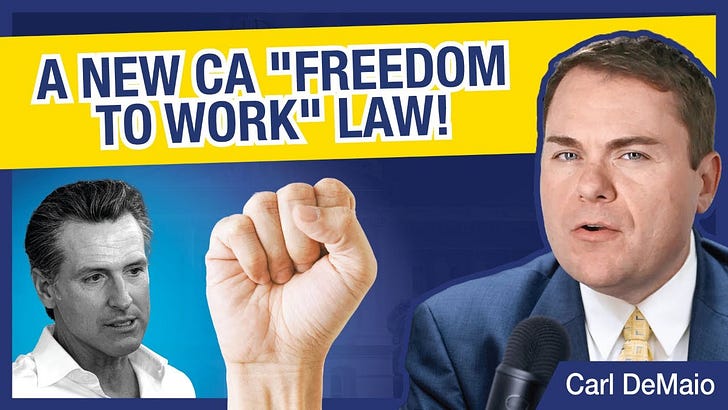


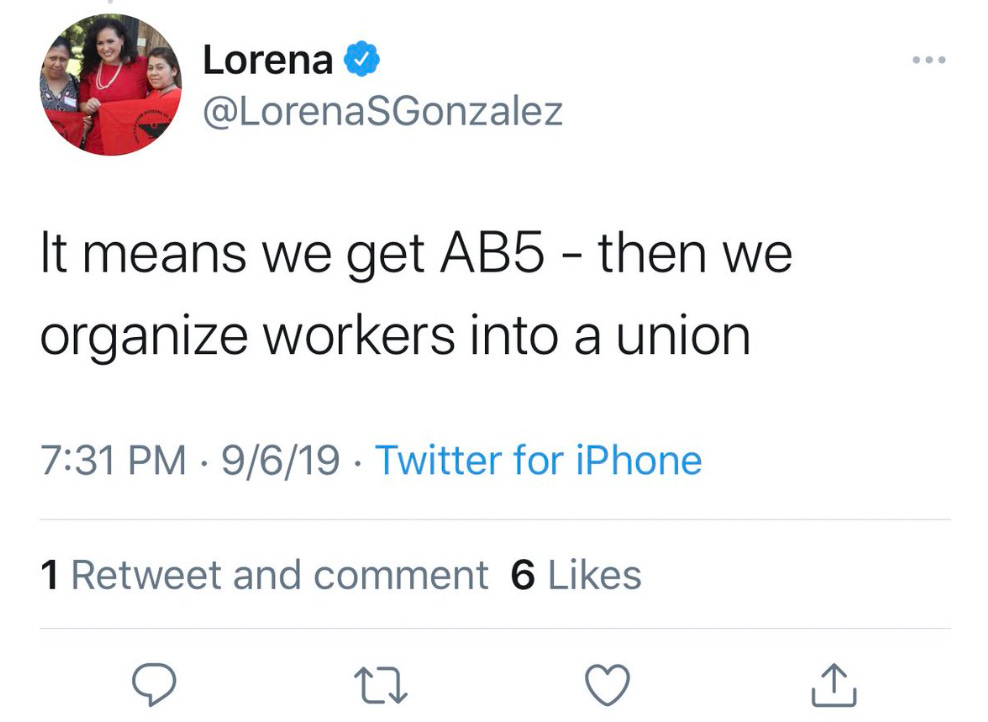
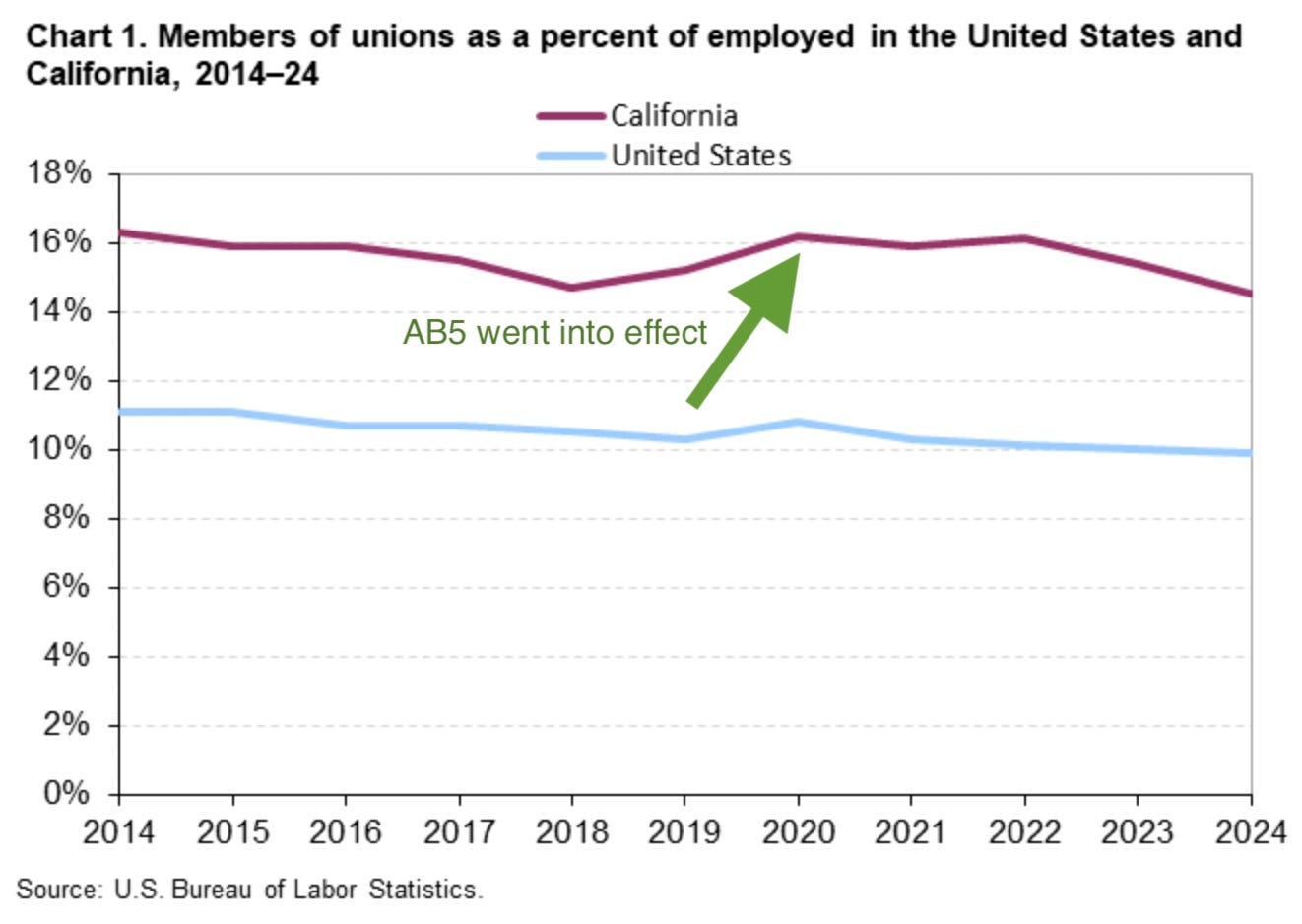
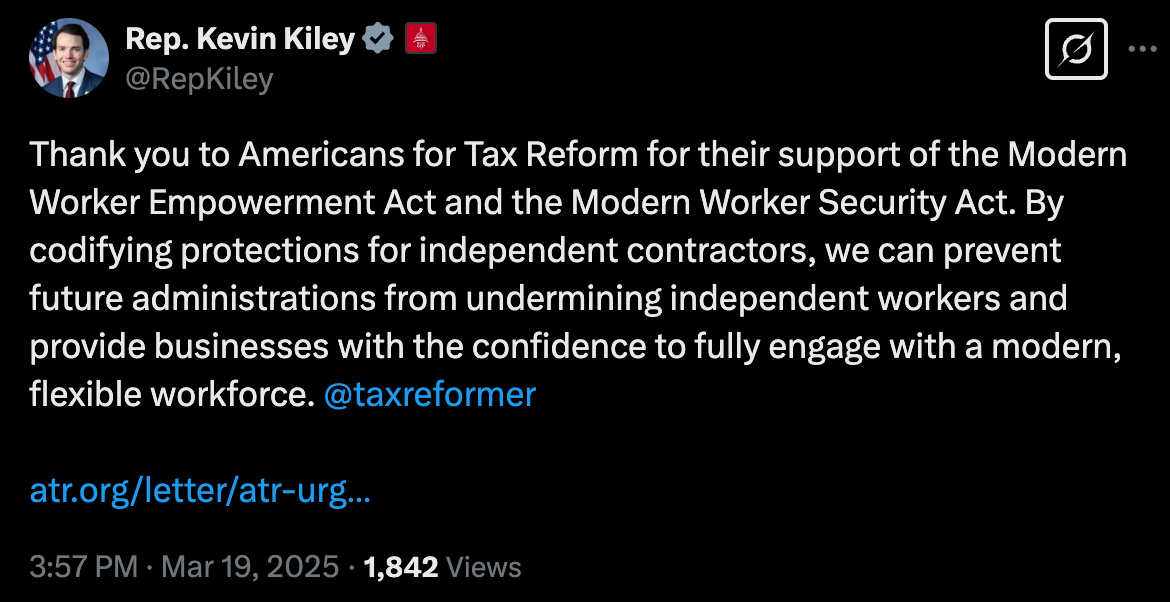
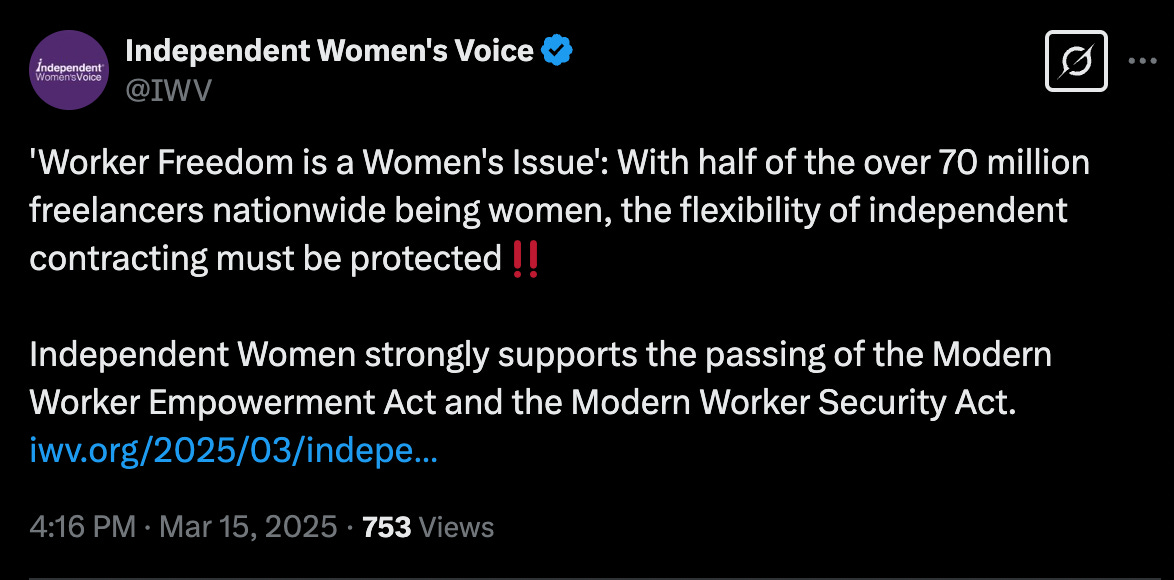
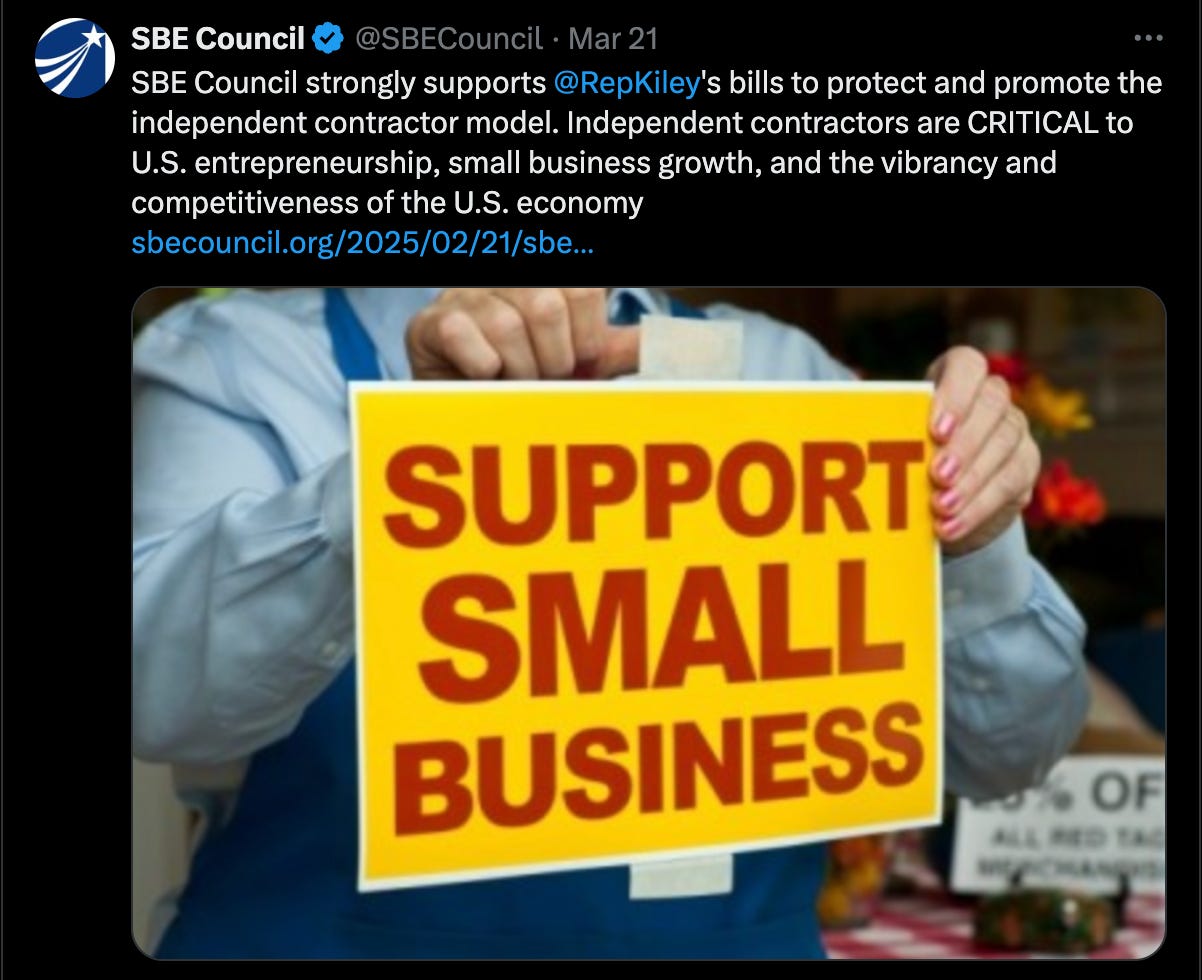
Thank you for covering this so thoroughly! It's been interesting (and disappointing) to see the national press focus predominantly on the gig app industry when discussing these kinds of laws, rather than exploring their impact on creative freelancers and service providers.
For me, one of the bigger elements that's often missing from national reporting on these laws is how they strip freelancers of their power to establish their own rates, ethics, hours, working conditions, etc. AB-5 basically handed employers all the power, even though its proponents claimed they were empowering workers. For example, a freelance photographer that's used to seeing $250 for an editorial portrait assignment for a magazine might only be offered $17 per hour as an employee, while not being allowed to work for other magazines. And a photographer who isn't comfortable shooting certain types of content might have no choice in an employer-employee situation (other than quitting their entire job), even though as a freelancer they would have had the ability to decline the gig without taking much of a hit to their income, since they would typically have other clients to act as a buffer.